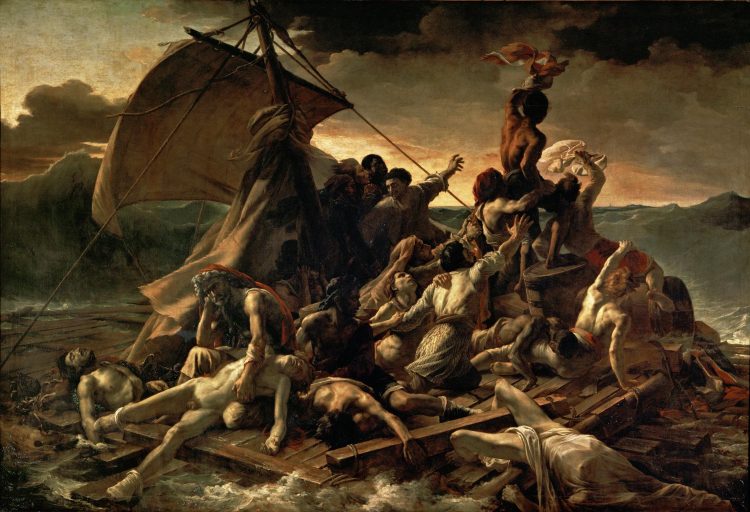
How to Live in a Pandemic
We are now into our fifth week of the global pandemic. How are you doing with that?
For some of us, the pandemic is mostly an inconvenience, where you can’t go out to eat or get a haircut.
But for others, these past few weeks have been very difficult. Some of you have lost jobs. Some have found your home life difficult. Some of you have been ill.
And it is likely to get worse before it gets better.
So, I want to ask you a question: How should we, as the people of God, live in such a time as this?
What do the Scriptures say about living in pandemics? What should our attitude be? What should we be praying for? What should we say to our friends and family who question where is God in all of this?
It turns out the Bible has a lot to say about living in difficult time and I want to show you some things today.
I want to take you to Romans 5.
Therefore, since we have been justified by faith, we have peace with God through our Lord Jesus Christ. Through him we have also obtained access by faith into this grace in which we stand, and we rejoice in hope of the glory of God. Not only that, but we rejoice in our sufferings, knowing that suffering produces endurance, and endurance produces character, and character produces hope, and hope does not put us to shame, because God’s love has been poured into our hearts through the Holy Spirit who has been given to us.
For while we were still weak, at the right time Christ died for the ungodly. For one will scarcely die for a righteous person—though perhaps for a good person one would dare even to die—but God shows his love for us in that while we were still sinners, Christ died for us.
There is a famous painting, The Raft of the Medusa. In the painting the artist, Theodore Géricault, depicts the events following the wreck of a French ship named The Medusa that happened in the 1800s. I have had the opportunity to view this painting at the Louvre in Paris several times. I found standing in front of this painting to be a powerful experience. The work is massive: 16 feet high and 23 feet long. Most of the figures in this painting are life-sized. In the foreground of the painting, there are men languishing on the raft, barely alive. Then our eyes are drawn upward. There are men gazing at the horizon waving flags. Do they see something? A ship perhaps? An island? The painting leaves the question unanswered.
I make reference to this painting because it illustrates how the word hope is often used in our society today. Hope is often seen as wishful thinking, or hope rooted in our own desires:
- I hope that spot on the horizon is a ship to come rescue us.
- I hope the pandemic ends soon.
- I hope no one that I love gets sick.
Is this what we as Christians mean by hope? Actually, nothing could be further from reality.
Getting back to Romans 5, the writer Paul says that as God’s people, “we rejoice in hope of the glory of God.“
Our Hope is actually rooted in what we know about God. What we know about His Faithfulness. What we know about His Goodness. What we know about the grand story of salvation as laid out in the Scriptures.
Hope (for the follower of God) is the expectation that my world will be transformed for good. Suffering and death will end. History with conclude with justice for all along with the restoration of all things. Most of all, love will continue forever; that we will be united with Christ for all time and that we will experience blessed reunion with all those we love who have died before us.
But our hope as God’s people is not just in future events; because of Jesus and what happened on Easter morning, we have hope today!
Melanie Salte in her teaching last week said, “In these shaky and uncertain times, I am grasping for the unshakable, and what I come up holding is this hope in eternal life with Jesus. I know that even if the worst-case scenario happens, although I may die, yet I will live. This is what I am promised as a follower of Jesus.”
Christian Hope is not just a pie in the sky, Pollyanna thought that in the sweet by and by everything will be all right. The Hope for each of us is that our Father holds us in the palm of His hand. He is with us now and He will go with us tomorrow and the next day and will give us the light of His presence even if everything else in our lives turns dark.
Even more than that, Christian hope knows that even in the face of world-wide suffering and pain, God is able to bring good into the world.
It is really the inescapable conclusion that we must draw as a result of Easter; that at the moment of the most heinous act of history—where God Himself, in the person of Jesus Christ, was put to death by the very people He created—God accomplished the very salvation of the human race.
So, the first part of our response to living in the time of a pandemic is that we rejoice in hope of the glory of God.
The Second response, according to the Apostle Paul in Romans 5, is that we are to rejoice in our sufferings.
Now, I have to admit that this does seems a little hard to swallow.
What if I can’t be with the people I love? What if I have just lost my job? What if I can’t pay my bills? How am I supposed to rejoice in that?
Let’s have a look at what is Paul saying here.
Paul says we rejoice in sufferings because we know.
And what do we know?
We know that suffering produces endurance, and endurance character, and character produces hope.
Paul is saying something that is very profound about suffering. He is saying that suffering means something. Suffering is not random; it is not pointless.
This perspective on suffering is so radical, it really is one of the main factors that separates Christianity from every other system of thought, religion, or philosophy.
For example, as Christians we believe that suffering is not karma; it is not payback for sins in a previous life. We also believe that suffering is not merely the result of bad luck, natural selection, or the survival of the fittest, in stark contrast to the secular society in which we find ourselves.
The Scriptures show us that suffering, and death, are unnatural and that moral and natural evil were not part of the original plan.
That is why as God’s people we are called to rise up to help those who are afflicted wherever we can.
So, if suffering means something, what does it mean for us practically on an individual level?
Paul says, “Suffering produces endurance, and endurance produces character, and character produces hope, and hope does not put us to shame, because God’s love has been poured into our hearts through the Holy Spirit who has been given to us.“
What Paul is saying here is that as we walk with Jesus through suffering we are transformed as people, that God does something to our attitudes and our character so that we reflect more and more what Jesus Christ is like. In those moments of suffering we realize that God is with us, alongside us, and we experience the love of God in a way that we had never experienced before.
This is why we rejoice in suffering, because in that moment, we experience the presence and love of Jesus in a deeper way.
Rejoicing in suffering is not stoicism, meaning we just need to keep a stiff upper lip (the ‘grin and bear it’ attitude). Stoics often hide their true feelings from everyone else, even though they may be dying inside. This is not what we see in the Scriptures. The Scriptural response to pain and suffering is to be honest before the Lord and others about how you are doing. In the book of Psalms we see many songs of Lament. In the Lament Psalms, the writers pour out their feelings of distress, alienation, and fear to the Lord. For an example, see Psalm 13.
This is the Biblical response: while we are called to rejoice in suffering, we are also called to be honest in our assessment of how suffering is affecting us.
I want to close with two questions for reflection this week:
First, what is your deepest hope today? What do you hope for in this moment more than anything else. It is often in our hopes and deepest desires where God reveals to us His working in our lives.
Second, what do you need to lament over today? What is causing you distress right now? Here are some words that might best help you express your state of mind: pain, loneliness, anxiety, fear, confusion, grief, and others.
I pray a blessing on you today, people of Calvary. I long to see you all again soon.
Scripture Reading:
Romans 5:1-8
Reflection:
- What is your deepest hope today?
- What do you need to lament over today?

[…] the blogpost these questions were taken from here. Please feel free to encourage Clorinda or share your own reflections on these questions in the […]